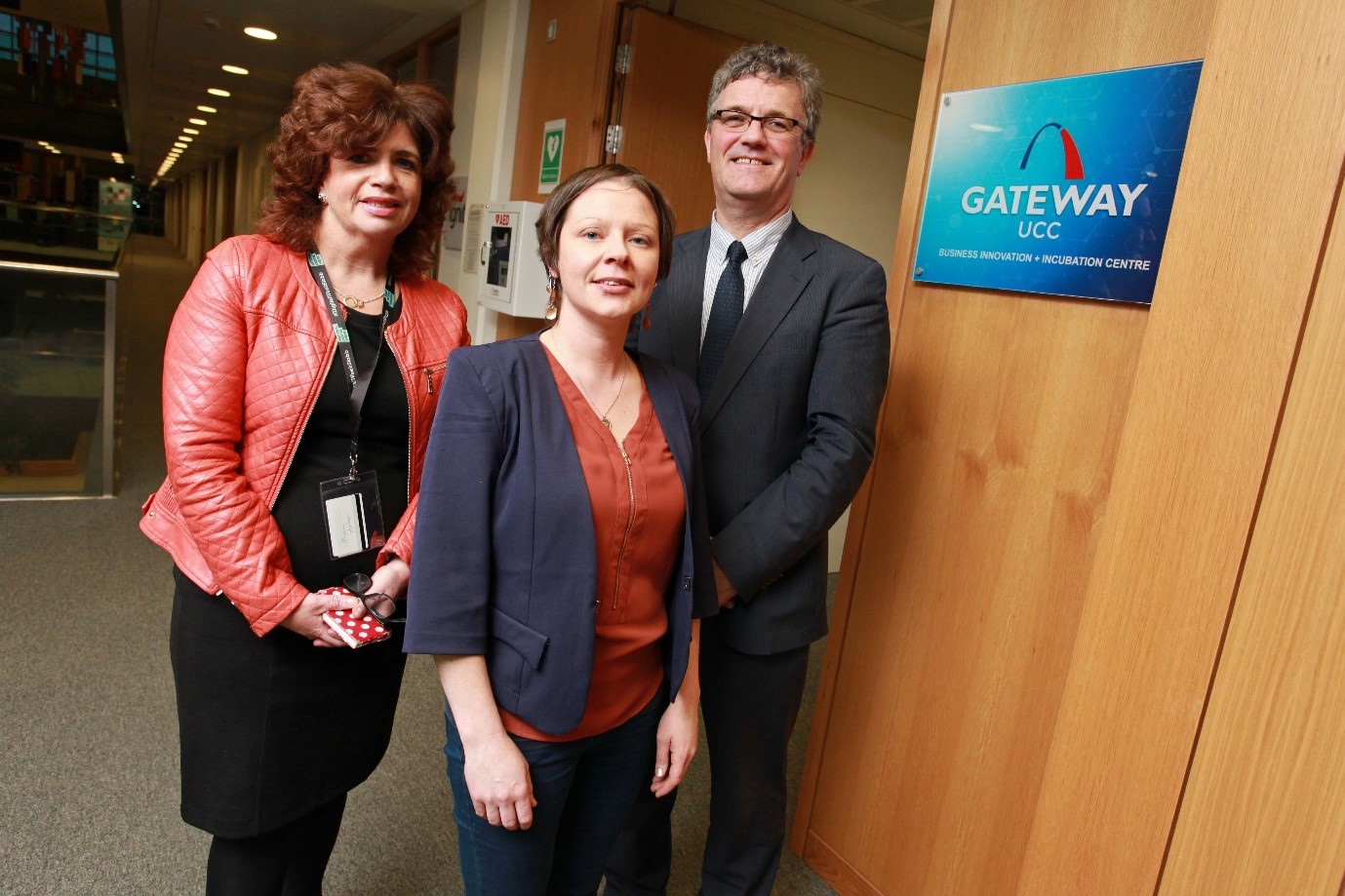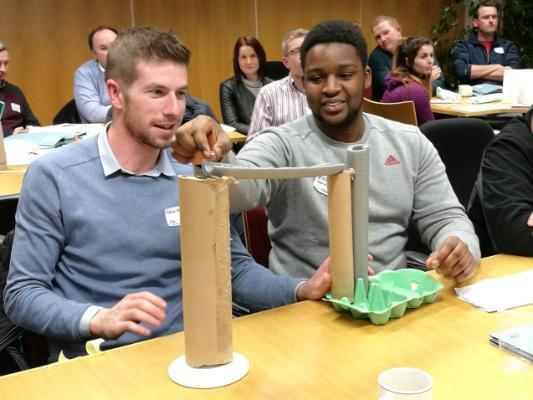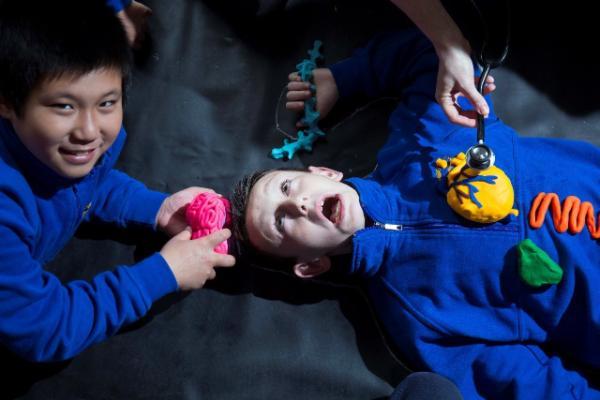STEAM Education – Inspiring the Next Generation!

Dr. Alice D’Arcy is Managing Director of STEAM Education. Alice has been involved with STEAM since it was founded in 2014. She manages the company and is also fully involved in the development and training of all STEAM programmes. Her background is in the area of environmental and sustainability science and creative education.
“The majority of jobs people will do in 10-, 25- or 40-years’ time don’t even exist today!” Most of us have heard a prediction like this about the near-future labour market. And many a concerned parent hearing this will ask themselves “just what will little Róisín do when she grows up?”
At least part of the answer lies in providing the next generations with opportunities and training in Science, Technology, Engineering and Mathematics – collectively known as STEM – because they will provide the vital skills base for most of these as-yet-unknown jobs. Heads of industry and government officials alike tell us that we must improve our output of STEM graduates, in order to keep pace with needs of the burgeoning information society we now live in. And they are investing vast sums in encouraging young adults to consider STEM as a career choice.
One Cork company, based in the UCC GATEWAY Incubation Centre, is intervening at a younger age, however, and with significant focus on the inclusion of Arts. STEAM Education Ltd was founded just over five years ago, with the aim of bringing STEM+Arts subjects to the junior school cycle.

Company Engineers & Primary School Teachers attending STEAM Engineering-in-a-Box training in the Western Gateway Building, UCC
Dr Alice D’Arcy, Managing Director, explains the company’s mission: “STEM subjects are frequently misrepresented as being dull, non-creative or overly difficult; while the arts are considered by many the preserve of only a creatively-gifted few. STEAM Education programmes aim to change these misconceptions through fun, practical learning which engages both creative and critical thinking. We also focus on the development of essential skills like communication, collaboration, and problem-solving. Additionally, international research points to early intervention (pre-teen) being critical to the long-term development of young people, and leading to increased engagement with STEM subjects.”
STEAM Education offer a variety of 10-week programmes to primary schools, with lessons tailored to the age group being taught. Every lesson has at least one hands-on, creative activity for the students, giving them immediate practical knowledge of the principles being explored. These activities vary according to subject – from identifying common traits across species, to building bridges at a model scale, to designing working remote-controlled robots. The unique blend of fun and learning engages the young students in a way that rote instruction rarely can.
Parents, teachers and students alike are enthused by this approach. As Patricia O’Donovan, 6th Class teacher at St Mary’s on the Hill in Knocknaheeny, put it: “Our experience with Science in a Box continues to create a ripple of excitement among the 6th class students. The well-prepared, interesting and hands-on lessons give each child, regardless of their ability, an equal opportunity to participate, question and offer opinions. Concepts and symbols, which would otherwise remain hollow and futile, are brought to life in an engaging way. The STEAM experience continues to impress.”
Now, you may well be thinking “All of this – course design, co-teacher training, lesson materials –must cost something, and our schools are stretched to the limit already!” Indeed so, and this is where industry enters the picture. Responsible corporate leaders are not just seeking to increase the pool of graduates who meet their skills needs. They also contribute to their local community through outreach and social engagement, and most multinational and larger indigenous companies have special budgets for this. Getting these companies to sponsor schools in their locality is how it all comes together.

Kids from Sundays Well Boys School participating in STEAM Science-in-a-Box
The other significant innovation of the educational approach lies in the actual teaching of the subject. Rather than expecting primary teachers to do all of this on their own, STEAM send industry professionals from the supporting companies into the classroom, to co-teach the programmes with the class teacher. This brings real-life working expertise directly to the young students, most of whom will never have met a genuine Process Engineer, Tool Machinist, Biochemist, etc.
It also gives the co-teacher valuable experience of being a trainer in a challenging, rewarding environment outside of their normal “daily grind”. Thomas O’Connell, Communications/Business Development with SISK Building Contractors co-taught STEAM’s “Engineering in a Box” programme in Ballygarvan National School last year. “I thoroughly enjoyed my teaching experience with STEAM. The kids responded with enthusiasm and ingenuity to our practical projects and worked well together in a positive and fun environment. It was a great experience!” Thomas told us.
Smaller local enterprises also sponsor these programmes, while the single biggest supporter of STEAM’s activities is the Naughton Foundation, who have been onboard from the very beginning. Local Authorities are engaged too, with Cork City and Fingal County councils all harnessing the expertise to deliver STEM programmes to disadvantaged schools in their catchments.
“The kids really love the hands-on programmes, and their interaction with scientists and engineers opens up a world of opportunities for them that they may not have previously considered. We believe it greatly encourages these kids to consider STEM careers and to progress to second and third level education”, according to Sandra O’Meara, Rapid Coordinator at Cork City Council.
County Councils, and indeed some companies, often simply don’t have specialists available to commit to a ten-week programme, but they can still participate through “fostering” a school, whereby STEAM sends a field-relevant postgraduate to deliver the programme on the sponsor’s behalf.
And they are no less enthusiastic about the results. “The boys and girls are very intuitive and are not afraid to ask 101 questions”, says Jessica Eivers, scientist & co-teacher for STEAM’s Science-in-a-Box programme with St. Mary’s on the Hill NS. “One girl said she would 'love to be a scientist for a day'. This programme could be shaping this girl’s future, which is the greatest gift to come from this.”
Postgraduates are recruited from third level institutes in the area of the schools involved. A number of skilled postgraduates in engineering and science fields from UCC and CIT have joined the Munster team. In Leinster we have worked with postgraduates from TCD, UCD, RCSI, DIT, DCU and AIT.
STEAM have benefitted greatly from their base in the UCC GATEWAY Incubation centre in terms of location, access to postgrad recruitment and the broader network of skills and support services provided to companies as part of the GATEWAY centre. The team based in UCC consists of Dr. Alice D’Arcy, (Owner & Managing Director), Prof John O’Halloran (Co-Director), Linda Egan (Communications and Company Engagement), Greg Scully (Accounts & Procurement), Juliet Haykal (Creative Content Design & Coordination), and David Zelaya (STEM training & content development).
For more on this story contact:
If you are interested in working with or finding our more about STEAM Education you can find us at:
2.29 GATEWAY UCC
Western Gateway Building
Western Road , Cork
GatewayUCC
GatewayUCC - Gorlann Ghnó
Contact us
C/O Office of Technology Transfer, Western Gateway Building, Western Road, Cork, Ireland.,
